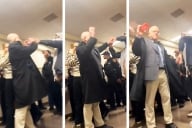You have /5 articles left.
Sign up for a free account or log in.
Northwestern University broke a cardinal rule of campus litigation last week: it issued a press release responding to specific allegations in a student's lawsuit, which accuses the institution of violating Title IX and failing to discipline a tenured professor who sexually assaulted her.
"While Northwestern does not typically comment to the media on pending litigation," officials said in a statement, "the university has noted that this complaint included substantial inaccuracies, which have been reported in the media and commented upon by the plaintiff’s counsel who filed the lawsuit."
Perhaps odder still, Northwestern admitted in the court filing it released that the professor, Peter Ludlow, did indeed violate the university's sexual harassment policy. Just not to the point where he could be fired.
Ludlow, after receiving sanctions including a pay freeze and prohibition of sexual relationships with students, which aren't normally banned at Northwestern, is on his way to a new university.
Many students are angry over what they see as inadequate punishment. On Tuesday, some students planned to walk out of one of Ludlow's courses, but he canceled class, ABC 7 News reported. So students held a protest instead.
The student alleges that Northwestern violated Title IX by acting with “deliberate indifference and retaliation” following her report of sexual harassment by Ludlow, a philosophy professor. She is currently a junior studying journalism, and was a freshman at the time of the alleged incidents.
“Northwestern admits that it conducted a prompt and thorough investigation of the allegations that plaintiff brought to its attention,” Northwestern’s answer to the lawsuit says, “substantiated some, but not all, of those allegations, found that Ludlow had violated the university’s policy against sexual harassment; and imposed several disciplinary sanctions and other corrective actions against Ludlow.”
Ludlow, meanwhile, may be about to start a new job teaching philosophy at Rutgers University. (A Rutgers spokesman said "no final offer has been made to Dr. Ludlow and the university intends to review all pertinent information before considering whether to make such an offer.")
Northwestern’s sexual harassment policy states, “If a complaint of discrimination, harassment, or sexual harassment is found to be substantiated, appropriate corrective action will follow, up to and including separation of the offending party from the university, consistent with university procedure.”
Anita Levy, associate secretary of academic freedom, tenure and governance at the American Association of University Professors, said there have been cases at other institutions in which professors were found to have violated policy, but with varying results.
"It does happen, and sometimes there’s dismissal, sometimes there’s not and it’s surprising that there isn’t,” she said. “We recommend in our report on campus sexual assault that there be a great deal of coordination between campus agencies and the local law enforcement. Just because certain due process procedures need to go forward on campus doesn’t mean that there can’t also be processes going forth in the world of law enforcement – especially in this case, which on its face looks like a case of sexual assault."
In her suit, the student says that after a night of bar-hopping and coerced drinking, which started as an invitation from Ludlow to attend a Chicago art exhibit that she pointed out, Ludlow took her up to his apartment, assaulting her as she faded in and out of consciousness. She says she "begged" Ludlow to stop kissing her, but he "groped her breast and buttocks," and told her that "it was 'inevitable' that they would have sex." Her next recollection is waking up in bed with Ludlow's arms around her at 4 a.m., the lawsuit says. "She panicked and blacked out.".
In its filing, Northwestern acknowledges that Ludlow drove around Chicago with the student and drank alcohol with her throughout the night, and that “Ludlow engaged in unwelcome and inappropriate sexual advances toward plaintiff by initiating rubbing her back and kissing her.” Its investigation did not find evidence of groping but did find, as the student said, that she woke up in Ludlow's bed with his arms around her.
Ludlow has denied the charges through his lawyer, saying the student instigated contact.
After finding that Ludlow had violated the university's sexual harassment policy, Northwestern took actions: precluding Ludlow from a raise in 2012-13, rescinding his appointment to an endowed professor position, "strongly advising" against one-on-one social contact with undergraduates, prohibiting any attempt to drink or provide alcohol or have a romantic or sexual relationship with students, requiring sensitivity and harassment training, prohibiting contact with the student who filed the lawsuit, and "officially warning" him that "any similar behavior in the future" or failure to follow these sanctions would result in further discipline.
The student says Ludlow's continued presence on campus contributed to her worsening mental health and academic performance.
Ludlow had appealed his sanctions, but they were reaffirmed by a faculty committee. While people may disagree with their findings, Levy said, it’s important to have professors involved when the question is whether a person is an effective teacher (and to ensure there are no academic freedom issues at play).
Questions of punishment severity – whether anything less than the “death penalty” is appropriate – is one that colleges struggle with, especially where possible assault is involved, said Peter F. Lake, a law professor at Stetson University.
In response to the lawsuit, "concerned faculty" at Northwestern posted an online petition calling for a stricter sexual assault policy, which would make sexual contact with an undergraduate an automatically fireable offense, regardless of tenure. Northwestern's student government has endorsed the change.
"We believe that the description of the Northwestern response to the student's allegations in the answer to her lawsuit indicates a failure of judgment," the petition says, before requesting that the university's Board of Trustees audit Northwestern's response to the lawsuit.
"I think from the outside perspective, there’s sometimes concern that these things are treated lightly,” Lake said, noting that rescinding a chair position is a very serious matter in higher ed that probably doesn’t resonate with the general public. “It becomes even more difficult to assess an appropriate punishment when you’re not entirely sure whether the evidence is overwhelming for one scenario or another, and it would be a real shame to under-punish for a rape because the evidence isn’t as clear as you want it to be."
Dozens of federal complaints have been filed in recent years on campuses across the country by students who say colleges violated their civil rights by failing to properly investigate and punish alleged assaulters. But student-brought cases against faculty members are less common.
The student is seeking payment for current and future medical bills, a tuition waiver and reimbursement, and compensation for emotional distress and attorney fees. Northwestern maintains it has fully complied with Title IX and is not liable in the lawsuit.
Northwestern does not prohibit “consensual romantic or sexual relationships” between students and faculty, but requires that the staff member in such a relationship "does not hold any supervisory or evaluative authority over the other person," and that he or she report the relationship to a superior. Ludlow taught the student in his philosophy of cyberspace course in fall 2011 (the alleged assault occurred the following February).
Failure to comply with the consensual relations policy results in "disciplinary action.... taken in accordance with relevant disciplinary procedures contained in the relevant handbooks, policies, procedures, practices or contracts," the document says.
But how one would define such a relationship is unclear. A Northwestern spokesman declined to comment further on the policy or whether Ludlow’s behavior would constitute a violation, citing pending litigation.
Most such policies do not get that specific, Lake said.
“Is a kiss a relationship? Is one date a relationship? Does it require an intention to continue? Is it a duration issue?” he said. “There is, I think, tremendous underrepresentation of violations of those policies, because they could be so severe as termination. So people tend to not turn people in for that.”
Of course, in Ludlow’s case, the student says consent was not given. But the situation points to the pitfalls of vagueness.
“Lack of clarity in the policies is just an open invitation for further scrutiny,” Lake said. “This is one of the issues that many of us struggle with.”








